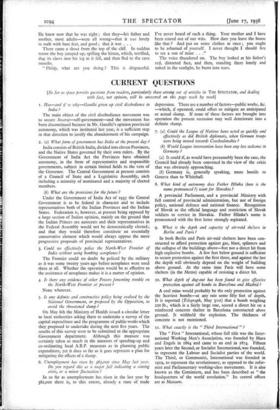CURRENT QUESTIONS [So far as space permits questions from readers,
particularly those arising out of articles in THE SPECTATOR, and dealing with fact, not opinion, will be answered on this page week by week] t. Has—and if so why—Gandhi given up civil disobedience in India ?
The main object of the civil disobedience movement was to secure Swaraj—self-government—and the movement has been discontinued because in Mr. Gandhi's opinion provincial autonomy, which was instituted last year, is a sufficient step in that direction to justify the abandonment of his campaign.
2. (a) What form of government has India at the present day ?
India consists of British India, divided into eleven Provinces, and the Native States governed by their own rulers. By the Government of India Act the Provinces have obtained autonomy, in the form of representative and responsible governments, subject in certain limited fields to the veto of the Governor. The Central Government at present consists of a Council of State and a Legislative Assembly, each including a minority of nominated and a majority of elected members.
(b) What are the provisions for the future ?
Under the Government of India Act of 1935 the Central Government is to be federal in character and to include representatives both of the Indian Provinces and the Indian States. Federation is, however, at present being opposed by a large section of Indian opinion, mainly on the ground that the Indian Princes are autocrats and their representatives in the Federal Assembly would not be democratically elected ; and that they would therefore constitute an essentially conservative element which would always oppose the more progressive proposals of provincial representatives.
3. Could we effectively police the North-West Frontier of India without using bombing aeroplanes ?
The Frontier could no doubt be policed by the military as it was some twenty years ago before aeroplanes were used there at all. Whether the operation would be as effective as the assistance of aeroplanes makes it is a matter of opinion.
4. Is there any evidence of other Powers fomenting trouble on the North-West Frontier at present ? None whatever.
5. Is any definite and constructive policy being evolved by the National Government, or proposed by the Opposition, to avoid the threatened slump ?
On May 6th the Ministry of Health issued a circular letter to local authorities asking them to undertake a survey of the capital expenditure and the programme of public works which they proposed to undertake during the next five years. The results of this survey were to be submitted to the appropriate Government department. Although this measure was certainly taken as much in the interests of speeding-up and co-ordinating local A.R.P. measures as in planning public expenditure, yet it does so far as it goes represent a plan for mitigating the effects of a slump.
6. Unemployment has risen by 382,000 since May last year. Do you regard this as a major fall indicating a coming crisis, or a minor fluctuation ?
In so far as unemployment has risen in the last year by 382,000 there is, to that extent, already' a state of trade depression. There are a number of factors—public works, &c. —which, if operated, could offset or mitigate an anticipated or actual slump. If none of these factors are brought into operation the present recession may well deteriorate into a definite slump.
7. (a) Could the League of Nations have acted as quickly and effectively as did British diplomats, when German troops were being moved towards Czechoslovakia ?
(b) Would League intervention have been any less welcome in Germany ?
(a) It could if as would have presumably been the case, the Council had already been convened in the view of the crisis that was obviously approaching.
(b) Germany is, generally speaking, more hostile to Geneva than to Whitehall.
8. What kind of autonomy does Father Hlinka (how is the name pronounced ?) want for Slovakia ?
A provincial Parliament, and a provincial Ministry with full control of provincial administration, but not of foreign policy, national defence and national finance. Recognition of Slovak as the official language and restriction of Slovak soldiers to service in Slovakia. Father Hlinka's name is pronounced with the first letter strongly aspirated.
9. What is the depth and capacity of air-raid shelters in Berlin and Paris ?
In both Berlin and Paris air-raid shelters have been con- structed to afford protection against gas, blast, splinters and the collapse of the buildings above—but not a direct hit from high explosive bombs. A few feet below ground is sufficient to secure protection against the first three, and against the last the depth will obviously depend on the weight of building above ground. At the same time Paris will have some shelters (in the Metro) capable of resisting a direct hit.
10. What depth of dug-out has been found to give effective protection against all bombs in Barcelona and Madrid ?
A coal mine would probably be the only protection against the heaviest bombs—at any rate some fifty feet of depth. It is reported (Telegraph, May 31st) that a bomb weighing 220 lb., which is a fairly large one, scored a direct hit on a reinforced concrete shelter in Barcelona constructed above ground. It withheld the explosion. The thickness of concrete is not mentioned.
11. What exactly is the " Third International " ?
The " First " International, whose full title was the Inter- national Working Men's Association, was founded by Marx and Engels in 1864 and came to an end in 1874. Fifteen years later the Second, or Socialist International, was founded, to represent the Labour and Socialist parties of the world. The Third, or Communist, International was founded in 1919, to represent the revolutionary, as opposed to the refor- mist and Parliamentary working-class movements. It is also known as the Comintern, and has been described, as " the headquarters of the world revolution." Its central offices are at Moscow.


















































 Previous page
Previous page